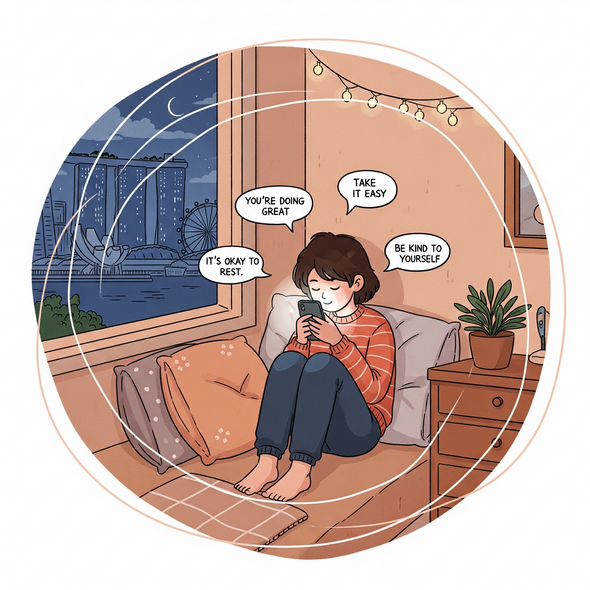Summary:
Young people worldwide face significant pressures, yet many hesitate to express their struggles due to fear of judgment and stigma around mental health. AI-powered mental health tools like chatbots such as Ommu offer a safe, anonymous space to vent and explore emotions without fear, providing support and practical tools for managing stress and anxiety. While not a replacement for professional therapy, these digital solutions are increasingly recognized for their role in promoting mental wellness.
Ever Wished You Could Talk to Someone—Without Feeling Judged?
You’re not alone.
Around the world, young people face heavy pressures—whether it’s school deadlines, figuring out career paths, family expectations, work stress, or simply trying to keep up with social and personal responsibilities. The emotional weight can quietly build up until it feels overwhelming.
But here’s the problem: even when we’re struggling, many of us hesitate to say, “I’m not okay.” Why?
Because opening up is hard.
Because mental health still feels like a taboo topic in many cultures.
Because we’re scared of being misunderstood—or worse, ignored.
What if there were a safe way to vent? Something that didn’t require you to explain everything perfectly, face someone in person, or fear being judged?
That’s where AI-powered mental health support steps in. And no, this isn’t just another tech buzzword—it may actually offer comfort, clarity, and connection in moments when we need it most.
💭 Why Opening Up Still Feels So Hard
Awareness about mental health is growing worldwide. You’ve probably seen campaigns in schools, heard influencers talk about self-care, or noticed more workplaces offering mental wellness programmes.
But let’s be real.
For many, saying “I need help” still feels terrifying.
You might wonder:
- “Will they think I’m being dramatic?”
- “What if they don’t take me seriously?”
- “What if someone finds out I talked to a counsellor?”
- “What if I don’t even know how to explain what I’m feeling?”
There are also real barriers:
➡️ Long wait times for therapy appointments
➡️ Fear of stigma or judgment from family and peers
➡️ Not knowing where to start or who to trust
Because of this, many people end up bottling things up—until it gets too heavy to carry alone.
That’s why anonymous, always-available digital support is becoming a powerful first step toward mental wellness.
🤖 3 Ways AI Can Support Your Mental Wellness
1. A Safe, Judgment-Free Space to Vent
AI chatbots like Ommu are available 24/7. You don’t need to make an appointment. You don’t have to prep what to say. And you don’t have to worry about awkward silences or being stared at across a counselling room.
You can just type.
Whether you’re…
- Coming home from a rough day at school or work
- Spiralling after a fight or breakup
- Struggling with stress and responsibilities
- Overthinking at 2am and can’t sleep
…AI is ready to listen. The responses are emotionally tuned, thoughtful, and designed to reflect what you’re expressing.
Even if you’re not ready to talk to a human yet, simply putting your emotions into words can be a meaningful first step.
2. Easy Tools for Everyday Anxiety or Low Moods
Mental health chatbots today aren’t just for chatting. They often guide you through practical, evidence-based tools to support emotional regulation and self-awareness.
These may include:
🌬️ Breathing exercises to calm your nervous system
📊 Mood check-ins that track emotional patterns over time
🧠 Cognitive reframing techniques to handle self-critical thoughts
🌍 Grounding practices for when you’re overwhelmed or dissociating
These tools may seem small—but they’re powerful for managing everyday stress, anxiety, and low moods.
Studies show that AI chatbots can provide real emotional relief.
For instance, a 2025 study in Psychiatry Research found that AI chatbots reduce symptoms of depression and loneliness while providing supportive interactions.[1]
And the best part? These tools are available anytime, anywhere, right from your phone.
3. Emotional Safety That Encourages Honesty
Let’s be honest—talking to a human therapist can still feel intimidating.
You might worry:
- “What if they don’t get it?”
- “What if they tell someone else?”
- “What if I say something wrong?”
That fear can make us filter our words or avoid opening up altogether.
But with an AI chatbot, there’s no social risk. No awkwardness. No one watching you cry. No one judging what you say.
Research shows that this emotional safety makes a real difference:
- A Harvard Business School study (2024) found that AI companions reduce loneliness when users perceive them as empathetic.[2]
- A Nature Human Behaviour study (2025) showed that interactions with AI chatbots reduced loneliness, particularly when conversations were emotionally supportive.[3]
- A Nature Communications study (2024) highlighted that AI chatbots providing virtual social support can alleviate feelings of isolation.[4]
For many, AI chatbots offer the first opportunity to feel truly heard without interruption or consequence, making it easier to explore and process emotions safely.
🌍 Global Perspectives: Digital Mental Health Is Growing Everywhere
AI-driven mental wellness support isn’t just a passing trend—it’s starting to be embraced worldwide.
- Research across Europe, North America, and Asia suggests that young people are more likely to open up when support feels anonymous, private, and always available. Backing this up, a 2025 study in JMIR Mental Health found that youth are especially drawn to digital platforms offering these features, since they allow them to seek help without the fear of being judged or exposed.[5]
- Digital programmes are being integrated into schools, universities, and workplaces, offering flexible support to those who may not seek traditional counselling. For example, Insight into Academia (2025) shows how colleges and universities are adopting teletherapy partnerships, app-based support, online CBT, real-time data analytics, and even AI chatbots to expand access to mental health care on campuses.[6]
- Governments and NGOs are stepping up investment in digital mental health tools to make support more accessible and reduce stigma. For example, The Times of India (2025) reported that the CBSE has rolled out the Tele-MANAS programme—a 24/7, multilingual platform offering confidential support directly to students.[7] Likewise, News.com.au (2025) highlighted that the Australian government has launched a free CBT service delivered by phone or video, removing the need for referrals and making care easier to access for underserved communities.[8]
The message is clear: young people everywhere want safe, stigma-free, and always-available support—and AI is becoming a meaningful part of that ecosystem.
⚠️ What AI Can’t Do (And Why That Matters)
While AI tools like Ommu are helpful, they aren’t meant to replace professional mental healthcare.
They can’t:
❌ Diagnose mental health conditions
❌ Provide crisis intervention or suicide support
❌ Offer personalised treatment plans
❌ Replace therapy for trauma, abuse, or complex emotional histories
Instead, think of AI as your first step. A warm-up. A mirror that helps you understand your emotions better—so that when you’re ready, talking to a counsellor or therapist feels less scary.
🚨 If you’re feeling suicidal or in immediate crisis, please reach out to your local hotlines (for example: the 988 Suicide & Crisis Lifeline in the US, Samaritans in the UK, or your country’s emergency services).
💬 A Message from Ommu
Hey 👋 I’m Ommu, a mental health chatbot built to support young people everywhere.
I’m here to talk—no judgment, no pressure.
You can vent after a rough day.
Explore your feelings when things feel “off.”
Or just chat when you’re lonely at 2AM.
I don’t keep your name. I don’t store your chats.
Everything is 100% private and anonymous.
You don’t need a diagnosis or a label. You just need to be human.
🌱 And I’m here for that.
🌱 Ready to Try?
Mental wellness isn’t just about handling big breakdowns. It’s also about the small moments:
- Taking a breath before school or work
- Journaling after a fight
- Naming how you feel instead of burying it
That’s what Ommu is for. To be your safe space—no matter how big or small your feelings are.
So whether you’re feeling okay, not okay, or somewhere in between, know this:
✨ You deserve support.
📲 You deserve a space to talk.
💙 And you don’t have to do this alone.
And if this post resonated with you, pass it along to a friend who might need a little support too 💙
Footnotes
Psychiatry Research. (2025). AI Chatbots and Mental Health Support. https://mhealth.jmir.org/2025/1/e63806
Harvard Business School. (2024). AI Companions and Loneliness Reduction. https://www.hbs.edu/ris/Publication%20Files/24-078_a3d2e2c7-eca1-4767-8543-122e818bf2e5.pdf
Nature Human Behaviour. (2025). Effects of AI Chatbots on Loneliness. https://www.nature.com/articles/s44184-023-00047-6
Nature Communications. (2024). AI Chatbots Providing Emotional Support. https://nyaspubs.onlinelibrary.wiley.com/doi/full/10.1111/nyas.15400
Ospina-Pinillos, L., et al. (2025). Youth perspectives on digital mental health platforms: a qualitative study. JMIR Mental Health, 12(1): e67949. Available at: https://mental.jmir.org/2025/1/e67949
Insight into Academia. (2025). Colleges are using tech to transform mental health care. Available at: https://insightintoacademia.com/colleges-are-using-tech-to-transform-mental-health-care/
Times of India. (2025). For students’ mental health, CBSE pushes Tele-MANAS scheme. Available at: https://timesofindia.indiatimes.com/city/nagpur/for-students-mental-health-cbse-pushestele-manas-scheme/articleshow/123551705.cms
News.com.au. (2025). Albanese government announces huge news for struggling Aussies. Available at: https://www.news.com.au/lifestyle/health/mental-health/albanese-government-announces-huge-news-for-struggling-aussies/news-story/b02aa83e9a5c15be770c7270af449223




